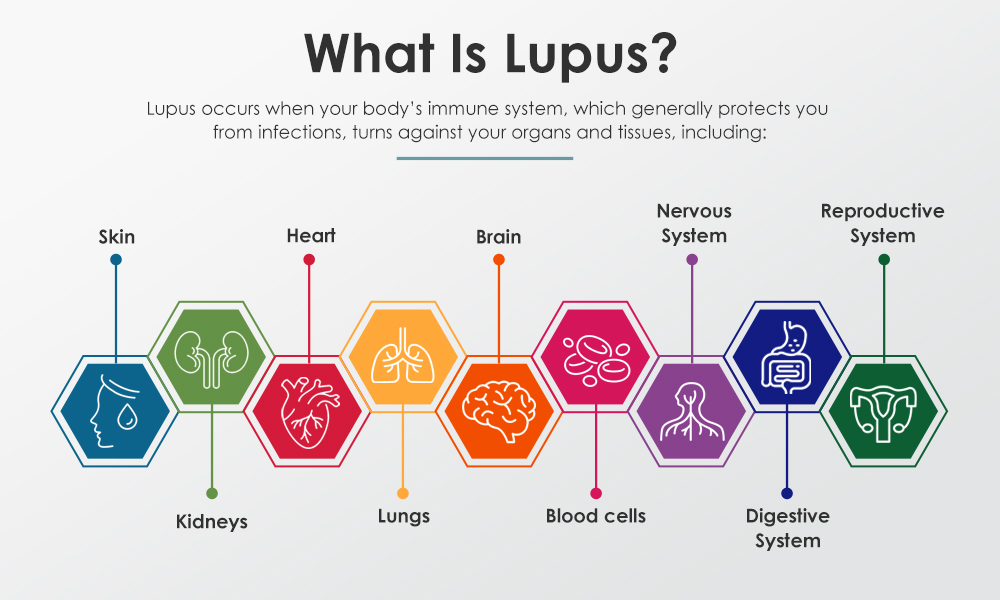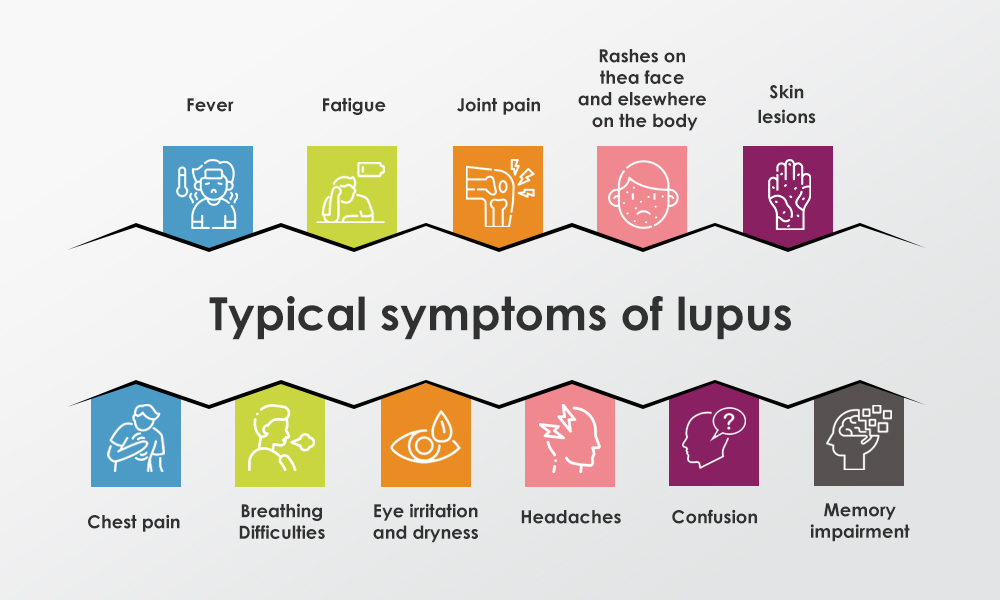The chronic pain, fatigue, and other symptoms associated with lupus can have a devastating impact on your ability to do routine daily activities and prevent you from working. Lupus is a chronic autoimmune disease that can affect the heart, lungs, brain, joints, and other organs and tissues. Although a cure for lupus does not currently exist, there are a number of treatment options to help people manage symptoms of the disease.
If you cannot work because of the effects of lupus, you may qualify for disability benefits through the Social Security Administration. This blog post explains the disability programs administered by the SSA that pay benefits to someone whose symptoms prevent them from working. It also explains what is required in order to receive a disability check for lupus.

What Is Lupus?
Lupus occurs when your body’s immune system, which generally protects you from infections, turns against your organs and tissues, including:
- Skin
- Kidneys
- Heart
- Lungs
- Brain
- Blood cells
- Nervous system
- Digestive system
- Reproductive system
The cell damage and inflammation cause symptoms that may differ and vary in their intensity from one person to another. Typical symptoms of lupus may include:

- Fever
- Fatigue
- Joint pain, swelling, and stiffness
- Rashes on the face and elsewhere on the body
- Skin lesions
- Chest pain
- Breathing difficulties, including shortness of breath
- Eye irritation and dryness
- Headaches
- Confusion
- Memory impairment
Until a cure is developed, healthcare providers treating patients diagnosed with lupus focus on treatment options to help manage the symptoms.
Treatment Options For Someone With Lupus
There are several treatment options that a doctor might suggest depending on the type and severity of the symptoms. Common medications that a physician might prescribe for a patient include the following:
- Nonsteroidal anti-inflammatory drugs, such as ibuprofen or naproxen, that reduce pain and inflammation.
- Antimalarial drugs have proven effective in treating the skin rashes, joint pain, and fatigue experienced by people with lupus.
- Prednisone, methylprednisolone, and other corticosteroids relieve inflammation and reduce activity in the immune system.
- Rituximab and other biologic drugs can be prescribed in appropriate situations to target the immune system.
If you have been diagnosed with lupus, your physician may recommend simple changes to your daily activities in addition to or in place of prescribed medications.
Lifestyle changes that a doctor may recommend for coping with the symptoms of lupus can include the following:
- Getting enough sleep to give your body a chance to rest and recover.
- Using yoga, meditation, and other relaxation techniques to relieve stress.
- Staying hydrated throughout the day by drinking adequate amounts of water.
- Watching what you eat and following a balanced diet.
- Avoid exposure to the sun or take measures, such as using sunscreen and wearing clothing to limit direct exposure to sunlight.
- Incorporating exercise and physical activity into your daily schedule.
- Smoking increases the risk of harm to your lungs and heart, so a lupus diagnosis is an excellent time to give up the smoking habit.
Ask your doctor to suggest lifestyle changes that match the type and severity of symptoms you experience.
Disability Benefit Programs Available Through Social Security
The Social Security Administration has two programs that pay disability benefits to people with medical conditions that prevent them from working. Social Security Disability Insurance or SSDI is a program for people who worked for a long time at jobs or self-employment and paid Social Security taxes on their income.
The Supplemental Security Income or SSI program is for people with limited income and resources who need financial assistance to pay for food and shelter. SSI does not require a work history, but you must not exceed the income and resource limitations and be disabled according to the definition used by Social Security.
What Is A Disability According To Social Security?
The SSA uses a strict definition of disability that applies to all applicants, regardless of their medical condition. To be considered disabled by the SSA, you must meet the following standards:
- You have a medical condition that prevents you from doing the work that you did before or any other type of work that is suitable for your age, education, and skills.
- Your medical condition has lasted or is expected to last at least 12 months or result in death.
- You are not earning more than the substantial gainful activity limit.
A measure of your ability to engage in substantial gainful activity or SGA is the amount of earnings you receive during the month.
If you earn more than the SGA limit, you are not considered disabled by the SSA, even if you have a severe medical condition. As of 2023, the monthly SGA limit is $1,470 for applicants who are not blind. The limit changes each year, so the SGA monthly earnings limit in 2024 increases to $1,550.
Is Lupus A Disability?
Whether you apply for SSDI or SSI, your application is evaluated to determine whether you meet the non-medical requirements. If you do, then it goes through an evaluation process to determine if you have a medical condition that is severe enough to make you eligible for disability benefits.
The SSA compiled a list of impairments, which has come to be known as the Blue Book. If you have a listed impairment and meet the specific criteria of the listing of impairments, it is considered severe enough to meet the disability standard used to determine eligibility for SSI and SSDI.
The Blue Book lists lupus as an immune system disorder in section 14.02. Someone with lupus must have medical evidence proving the following in order to meet the listing standards:
- Involvement of two or more organs or systems of the body with one organ or system involved to at least a moderate level of severity with at least two of the following symptoms: fever, severe fatigue, malaise, or involuntary loss of weight.
- Repeated manifestations of lupus with at least two of the following symptoms: Severe fatigue, fever, involuntary loss of weight, malaise, and limits at least one of the following: daily living activities, social functioning, ability to complete tasks in a timely manner.
The fact that you do not match the listing criteria for lupus does not end the evaluation process to determine whether you qualify for disability benefits with lupus.
If you match the criteria of the Blue Book for lupus, you may qualify for disability benefits based on your residual functional capacity or RFC. RFC is an assessment made by the SSA of your physical and mental capacity to do work-related tasks on a continuing and regular basis.
Your medical records, symptoms, treatment and work histories, age, education, and skills are evaluated to arrive at your RFC. The evaluation process seeks to determine whether your RFC prevents you from doing the type of work you did in the past or other kinds of work available in the national economy.
RFC evaluates mental capacity as well as physical capabilities, which is an important consideration for someone living with the effects of lupus. Mental limitations can be significant for some individuals who have lupus. For example, 70-80% of people with lupus experience cognitive impairment, which may include the following:
- Impaired memory
- Confusion and difficulty concentrating
- Inability to multitask
- Impaired comprehension
- Difficulty thinking and solving problems
When seeking disability benefits for lupus, cognitive impairment may be as significant as the physical limitations of the disease in proving that you are disabled and unable to work.
How Much Are Disability Benefits For Lupus?
“How much is a disability check for lupus?” is a common question people ask when their application for SSI or SSDI is approved. The 2023 maximum federal SSI benefit is $914 per month for an individual and $$1,371 for eligible couples. A cost-of-living adjustment increases the monthly federal benefit to $943 for individuals and $1,415 for couples.
You may receive a disability check for lupus that is more than the federal amount if you live in a state that pays a monthly supplement to SSI beneficiaries. On the other hand, the monthly federal benefit may be reduced if you have income from sources other than SSI, such as SSDI benefits or earnings from a job.
Your lifetime earnings record determines the amount you receive each month through the SSDI program. According to the SSA, the average monthly SSDI payment was $1,486.89 in 2023. SSDI benefits will increase in 2024 because of a 3.2% cost-of-living adjustment.
Choosing A Disability Law Firm
If you have been diagnosed with lupus and cannot work, getting the disability benefits you need and deserve can be a challenge with 63.2% of initial applications denied. The Clauson Law Firm offers a free consultation where an experienced disability lawyer can review your claim and explain what we can do to help you win disability benefits for lupus, even if your claim was initially denied.
Talk to a lawyer today by contacting Clauson Law. Learn how we make a difference by aggressively fighting on your behalf and allowing you to focus on your health.


